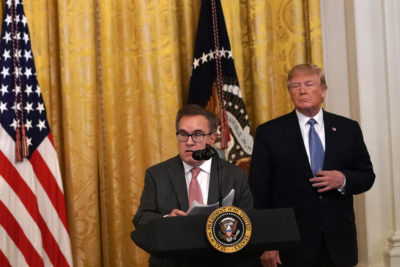EPA administrator Andrew Wheeler with President Trump. The administration has rolled back, or is seeking to roll back, 95 environmental regulations. ALEX WONG/GETTY IMAGES
The Trump administration is expected to weaken regulations on mercury pollution from oil- and coal-fired power plants this week, several news outlets reported. The new rule will change how the U.S. Environmental Protection Agency calculates the costs and benefits of reducing releases of mercury and other toxic metals, undermining the legal justifications for limiting the pollutants.
Without those legal justifications, companies would have an avenue to challenge the Mercury and Air Toxic Standards (MATS) in court and “prevent similar regulations from being implemented in the future,” Reuters reported.
The mercury limits were created in 2012 under the Obama-era EPA and were the first federal standard to order power plants to install mercury-control technology. At the time, the EPA justified the regulation — which costs the industry $9.6 billion a year — by counting not just the direct benefits of lower mercury levels, but also the co-benefits from things like lower emissions of sulfur dioxide, particulate matter, and other pollutants, according The New York Times. The new Trump administration rules will eliminate these co-benefits from the mercury limits’ cost-benefit analysis.
“This action, which is a gift to the coal industry at the expense of all Americans, is an attack on public health justified by a phony cost-benefit analysis that purposely inflates the cost of MATS and ignores the value of the human health benefits,” Ellen Kurlansky, a former air policy analyst at the EPA who helped to develop the MATS rule, told Reuters.
The decision is the latest in the Trump administration’s sweeping rollback of environmental regulations, several of which have come amid the current Covid-19 pandemic. According to Frontline, since early March the EPA has lowered fuel economy and emissions standards for the auto industry, stopped the enforcement of environmental regulation on industries being impacted by the coronavirus, and made progress on a proposed rule that would severely limit the kinds of health data the agency is able to use in its decision-making.



